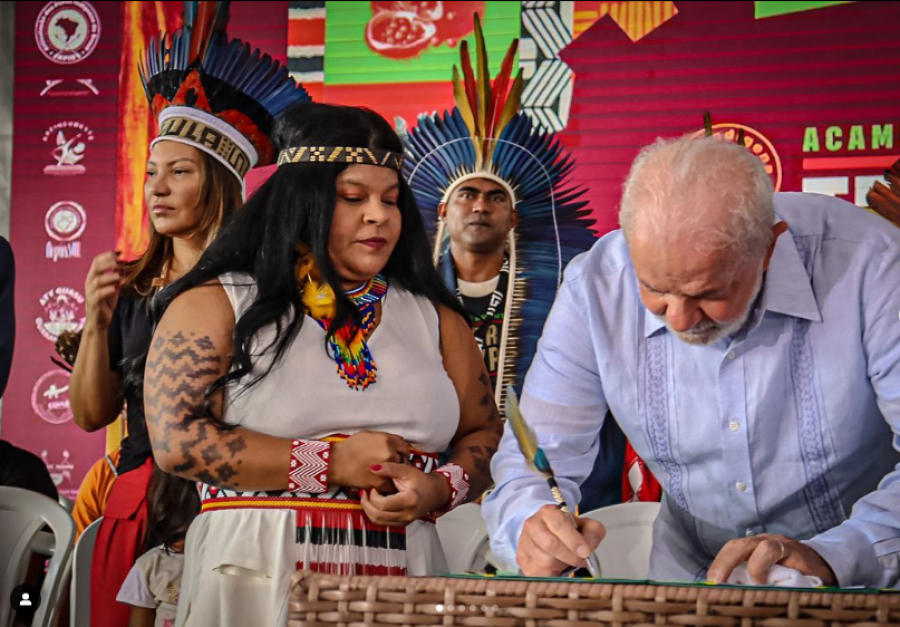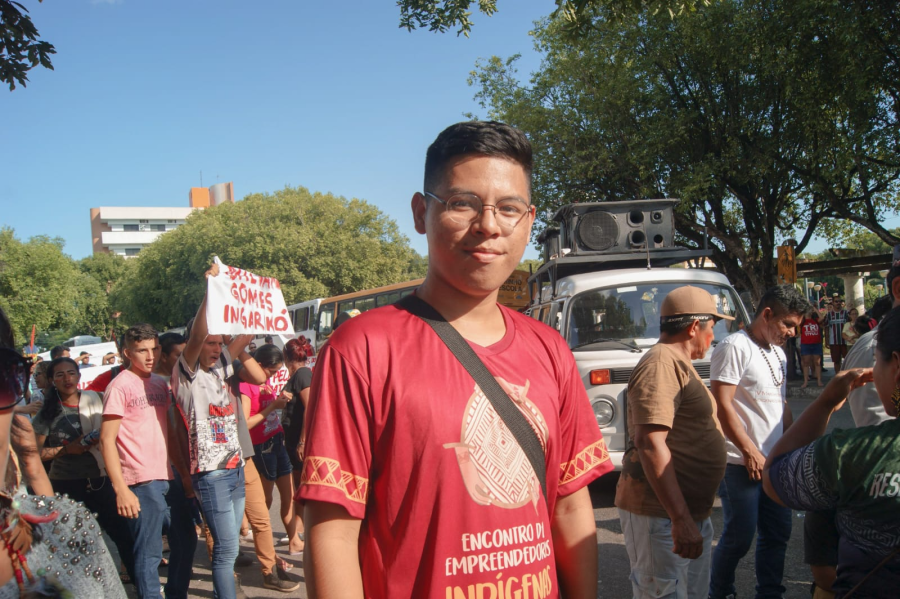The Guarani Indians, numbering 27,000 are the largest Indian people of Brazil, yet local ranchers and government-supported development projects have forced them into the country's smallest Indian areas. In the state of Mato Grosso do Sul, which contains Brazil's highest concentration of Guarani, a near constant state of invasion by local ranchers has led to a dramatic decline in the living conditions of the Indians. The problems facing the Guarani are typical of those facing indigenous people throughout South America and the world: victims of land loss, forced labor and poverty. This solution, however, is suicide.
Designated Indian areas are unable to provide even the minimal land requirements for the Guaranis' traditional lifestyles. Local ranchers have already deforested much of the land and killed most of the fish and birds, forcing many Guarani to leave their lands and to accept poor working conditions on sugar cane plantations, alcohol plants, and charcoal factories. At least 8,000 Guarani are presently working under such conditions with no labor rights.
The Guarani Kaiowa of Jaguapire have been removed from their lands by ranchers three times in the past five years. Mato Grosso do Sul courts have repeatedly ruled that Jose Fuentos Romero, a rancher from Sao Paulo, has legal claim over the land on which they are currently living. This ruling blatantly disregards an order by Brazil's Minister of Justice, who in 1992 had declared 2,089 hectares of land to be the permanent possession of the Guarani-Kaiowa. The rulings also violate Brazil's 1988 Constitution, which promises indigenous peoples exclusive rights to their traditional territories.
Despite both these federal guarantees, the Kaiowa of Jaguapire presently occupy only a third of the land turned over to them by the Minister of Justice. A second rancher has obtained an injunction barring the Indians from the remaining two thirds of the area, which he has claimed to be his own.
Still, Jaguapire's Kaiowa have somehow-managed to crowd into their 713 hectares of land. Since their last removal, each family has been able to build a home and keep a plot of land. After many years of dependence on FUNAI (Brazil's governmental indigenous affairs agency) for their food, the Kaiowa are once again able to maintain their own gardens and provide for themselves. Now, however, the Kaiowa are again facing the loss of their self-sufficiency. In November 1993, Mato Grosso do Sul's first Federal Court accepted Jose Fuentos Romer's claim to the community's 713 hectares and ordered the immediate removal of the Indians from the area. The Federal Prosecutor's office has appealed the decision of the court, and has obtained an injunction to suspend its execution.
The response of the Guarani-Kaiowa community these circumstances, however, is alarming. Since 1987, the Guarani-Kaiowa subgroup has experienced a very high suicide rate. Sixty suicides were officially recorded among the Kaiowa between 1987 and 1991. A recent newsletter from Amanaka'a (a New York based indigenous group that recently investigated the situation of the Kaiowa) reports that roughly 120 Kaiowa have killed themselves in the last three years. Seven suicides have already been reported by FUNAI for 1994. For the Kaiowa, the suicides - which are carried out according to a Guarani custom resembling hanging - have been a reflection of despair. They stand as testaments against the displacement and abuse that have too long marked their existence in Mato Grosso do Sul. However, the suicides are not a protest. Simply, the Guarani see no other alternative. They cannot and will not live without the land.
Political instability in Brazil has greatly weakened federal control over local governments and judicial systems. With little sympathy from local governments, and inadequate federal protection, the indigenous groups often lose their lands and their rights because they lack political standing.
Having learned of the potential fourth and permanent removal from their land, the Kaiowa community of Jaguapire sent a letter to FUNAI last November 1993 informing the agency of their intention to commit collective suicide if the orders are not reversed. According to the letter, the Kaiowa are preparing to fight to defend their homes if their land rights are not reinstated. If this fails, they say, they will take their own lives rather than be forced off their land once more. Either way, the deaths of many Kaiowa are assured if their land rights are not restored. The tribal leaders of 22 neighboring Guarani villages have declared that they, too, are willing to die in support of the Kaiowa.
The Guarani-Kaiowa struggle is not an isolated incident. Invasions of Indian lands continue throughout Brazil and over 40,000 hectares of land are being contested in courts by wealthy landowners today. In Mato Grosso do Sul alone, eleven other Indian communities are currently involved in struggles for their land.
Until now, Brazil's leaders have been unwilling to take a strong stand in defense of the indigenous inhabitants of Jaguapire, and FUNAI has been unable to provide adequate protection of their rights. With violent attacks such as those throughout Mato Grosso do Sul increasing, the Kaiowa community - almost two-thirds of which is comprised of individuals under twenty years old - has clearly stated that it refuses to be abused and will no longer live in fear. Unless their land rights are restored, the Kaiowa must choose between death or eventual assimilation. They have made it clear they prefer to die.
Readers wishing to aid the Guarani-Kaiowa in their land rights struggle can send faxes and letters to the judge presiding over this case requesting a quick and fair judgment. These letters and faxes can be sent to:
Dr. Pedro Rotta, Tribunal Regional Federal da 3a Regiao, Rua Libero Badaro, 30 - Centro, 01009-000 Sao Paulo - SP, Brazil, fax (55 11) 35-3994 or 35-0496.
CSQ thanks Christine Halvorson, Amanaka'a Amazon Network's Guarani Campaign Coordinator, for her help on this article. For more info on the Amanaka'a Guarani Campaign, please contact the organization at 339 Lafayette Street #8, New York, NY 10012, tel. 212-674-4646, fax 212-674-9139.
Article copyright Cultural Survival, Inc.


